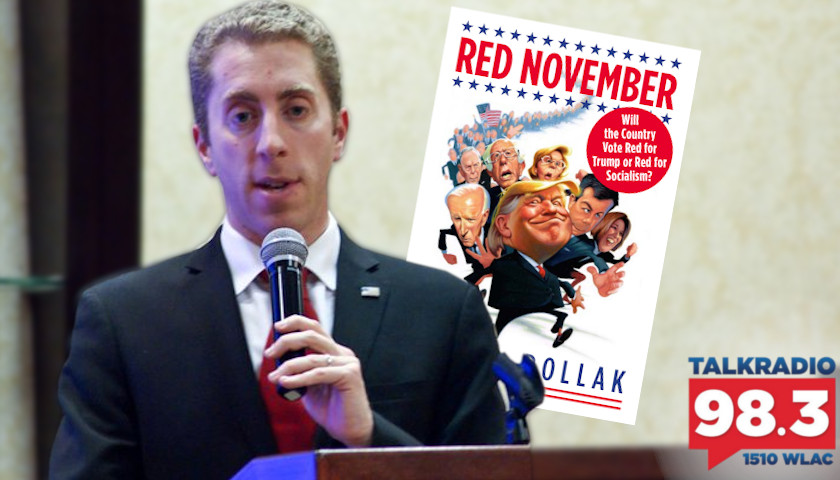On Tuesday’s Tennessee Star Report with Michael Patrick Leahy – broadcast on Nashville’s Talk Radio 98.3 and 1510 WLAC weekdays from 5:00 a.m. to 8:00 a.m. – host Leahy welcomed Joel Pollak who is a South African-American Conservative political commentator, writer, and attorney. Pollak also currently serves as the senior-editor-at-large for Breitbart News.
During the third hour, Pollak discussed his new book, “Red November: Will the Country Vote Red for Trump or Red for Socialism” in which he describes the Democratic primary process and the resurrection of Joe Biden.
Leahy: We are joined now by my very good friend and Breitbart colleague and author of ‘Red November: Will the Country Vote Red for Trump or Red for Socialism, Joel Pollak. Joel welcome to The Tennessee Star Report.
Pollak: Great to be with you and good morning.
Leahy: Good morning to you. You are calling from California so you are up early Joel as always working hard.
Pollak: (Chuckles) My workday starts around 4 or 5 a.m. here in Los Angeles because we have to keep our east coast up which media sets the time table for us. So we get up early here but the advantage is we get a little break later in the day to enjoy the sunshine.
Leahy: You’ve been an editor at large since 2011. I think you are one of half of a dozen people that have been there longer than I’ve been there. I’ve been there since 2012. We have worked on many a story together and I’m fascinated by your account of the Democratic 2020 primary. Tell us how this book got started.
Pollak: I always wanted to write a book about the Democratic primary. In a sense the idea was born 20 years ago when I picked up a copy of David Halberstam’s book called The Unfinished Odyssey of Robert Kennedy at a used book store. I’m looking at that copy of my book now. It’s pretty hard to find. My copy is basically falling apart because I have used it so much over the years. It’s such a tragic story.
And I thought it would be great to write a similar story. Not a gotcha book or as a political insider with chit chat and gossip. But a real story about how a primary process tells the story of America. And this book Red November tells the story of how the Democratic party became so left-wing that it’s now talking about policies that we would have recognized as socialist.
Which are in some cases unabashedly. And how did we get here? So I go through the journey from the beginning of the primary earlier in 2019 and all the way through that year to the Iowa State Fair last summer to New Hampshire and South Carolina.
Then all the way through to the primaries this year which were overshadowed by the impeachment and then of course interrupted by the coronavirus. It’s a dramatic telling of news stories that might seem familiar to us but which actually are sort of strange because so much has happened in the last year. To read this book is to escape into a kind of fantasy that turns out to be the reality that we live through.
Leahy: It’s described as a part travelogue, part memoir, and part analysis. What is the first chapter of your book? Where do you begin the book in 2019?
Pollak: The first chapter actually starts out in Los Angeles in 2020 on March 1. It was two days ofbefore Super Tuesday and at that point it looked like Bernie Sanders was going to be the nominee for the Democratic Party. He had won the popular vote in Iowa, New Hampshire, and in Nevada. Nobody had ever done that before.
No candidate from either party had ever won all three of the early primary stage, at least in terms of the popular vote. Pete Buttigieg narrowly heads out the Bernie Sanders campaign in Iowa in terms of delegates. But it was really a decimal point kind of a victory. And Sanders clearly won the popular vote there.
It was very unusual. Sanders almost won more than 50% of the total vote in Nevada. So he was just on a role. Then Biden won South Carolina. Now Biden had been expected to win South Carolina but what happened on that March 1 and the day that followed March 2 was that the entirety of the Democratic Party came down against Sanders and united behind Biden.
And one by one all these candidates, Pete Buttigieg, Amy Klobuchar, Beto O’Rourke they all flew to Dallas in a little pub somewhere, they called it a rally but it was really a meet and greet and they delivered these long speeches covered by all the cable news networks endorsing Joe Biden.
And Biden went on to win Super Tuesday in a convincing fashion which changed the course of the race. We have Joe Biden as the Democratic nominee today because of what happened over the 48 hours from that moment in Los Angeles forward. And Bernie Sanders was in LA for a Super Tuesday rally featuring the rap group Public Enemy.
The theme of the rally was Fight the Power. Which if you know Public Enemy’s repertoire you know this song is about standing up to political establishment but in a revolutionary way. And Sanders was not shying away from his left-wing policies and his left-wing activist, grassroots movement.
He was embracing it. The Democratic Party was on the verge of being taken over by people who were outright socialists. But to appease them, Joe Biden had to move so far to the left that his policies are virtually indistinguishable now of those of Bernie Sanders. That’s where I start things.
Then I look back and say how did we come to this point. How did we get to the point where the Democratic Party is essentially the socialist party. They are not even really ashamed about it. It’s not controversial anymore to say that. Biden opposed socialism as a label but he has embraced it in substance.
How did we get here? So I start at the end and I look back and work our way forward. I introduce you to all the candidates and how they launched their campaigns and the different things they brought to the table. I even tell you about some of the off-ramps, the people who fell off the trail pretty early.
And we kick it off again in Miami at the first presidential debate and work forward from there. It’s a lot of fun. Then we get too old-style campaigning which we don’t really see much of right now because Joe Biden is in his basement broadcasting on Zoom right now.
We start out with the shaking hands and kissing babies and eating fried Oreos at the Iowa State Fair. Getting up on soapboxes and town hall meetings in the middle of farms and the mountain country of New Hampshire. Church meetings in South Carolina. We just go through it all. Then we have the impeachment which just hits everything and slows everything down and prevents Democrats from campaigning in their own caucus in Iowa.
There were only two candidates on the campaign trail back in January that was Joe Biden and Pete Buttigieg but because of all the other candidates most of whom were Senators were stuck in Washington. Andrew Yang was out there in Iowa but he wasn’t having much of an impact there.
Then you have the coronavirus which slowly creeps in and the candidates aren’t really thinking about it or talking about it. The only one who really is is Donald Trump because he has to deal with it. But then by the end of February, it starts to become an issue. Then by mid-March it shuts down campaigning altogether.
Leahy: So Joel, you and I were actually in Iowa together during the Iowa caucuses [in February]. We covered the caucuses and you covered several in Des Moines. I was out in a suburban area. And Joe Biden had a terrible performance there. Are you really surprised at the comeback he’s had from a dismal fourth-place finish in Iowa to basically the presumptive nominee?
Pollak: It was one of the most remarkable comebacks in American political history. He had not won any primary in three decades and more of running for president. Remember this was his third try. His first try was in the 80s. He had never one a primary or a caucus.
He did so badly in Iowa both times that essential it had not. this time with the help of Barack Obama’s political machine he had the support of the African American community in South Carolina. And in that state, black voters are about 60% or so of the electorate.
So that was very very important to him. He kept saying this was going to be his firewall and this would be the state that breaks the momentum of which other candidates are winning in the three earlier primary states. He started to look like he was slipping in several points. Over the summer in 2019, Kamala Harris surged and she started doing well in South Carolina.
And then as Bernie Sanders built support he started doing well in South Carolina. But Biden has the loyalty of the Democratic Party establishment in the Palmetto State. And once James Clyburn, the senior member of the Congressional Black Caucus who represents part of South Carolina and he represents the capital city.
Once he came out and endorsed Biden that was in a sense the signal for black voters that Biden was to be taken seriously. And that really swung a lot of the momentum behind Joe Biden. Now interestingly they don’t really have that much early voting in South Carolina.
Leahy: So it was kind of a day of turning.
Pollak: Yes.
Leahy: The big question for you Joel that I have is and you pose it in the title of your book Red November. Will the County Vote red for Trump or Red for Socialism. What’s your take now five and half months ahead of the election?
Pollak: I think that people are still tuned out. They are comparing Trump to the ideal rather than the opposition. I think Trump’s done an exceptional job responding to the coronavirus but certainly it’s something that took many Americans by surprise.
So the buck stops here. So he’s in charge and people are asking he could have done better and whether this economic devastation that we’ve seen could have been avoided. I don’t think it could have been. I think his management skills have been exceptionally suited to this crisis because he’s had to steer businesses out of trouble and he’s doing very well. When it comes close to November you’re going to see Trump compared to Biden.
Leahy: And he didn’t look very good with that big black mask. Joel Pollack. Thanks for joining us. The book, Red November: Will the Country Vote Red for Trump or Red for Socialism. Go to amazon.com and get it. Joel, thanks for joining us!
Pollak: Thank you.
Listen to the third hour here:
– – –
Tune in weekdays from 5:00 – 8:00 a.m. to the Tennessee Star Report with Michael Patrick Leahy on Talk Radio 98.3 FM WLAC 1510. Listen online at iHeart Radio.
Photos by Joel Pollack.




